
Commentary from Scott Campbell and students
Books
CULTIVATING HUMANITY
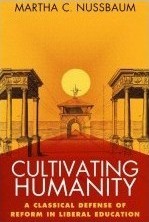
Cultivating Humanity
Martha Nussbaum
(Cambridge: Harvard University Press, 1997).
In this text, Martha Nussbaum draws a distinction between the Old and the New Liberal Education. The Old Liberal Education is characterized by obedience to time honored traditions, without critical reflection. Through the New Liberal Education, one becomes a free person and a world citizen through Socratic inquiry, a global sensibility, and the imaginative power to experience the world as others do. Nussbaum presents a contemporary approach to liberal education that is, nonetheless, grounded on traditional, philosophical (Socratic) principles of critical thinking. This is an excellent text for meeting students where they are now. It recognizes the need for students to develop practical skills to negotiate an increasingly globalized world.
"Cultivating Humanity advocates for the reform of liberal arts 'core' programs in order to meet the demands of our complex, diverse world, based on Socratic self-examination, global citizenship, and a narrative imagination. It taught me that classroom debates are vital: our own customs and beliefs are not universal, so in order to be well-rounded citizens, our beliefs need to be contested with those of others." ~Hayley Johnson
"Cultivating Humanity by Martha Nussbaum is about the practical and political purposes of a liberal education. It is clear that the liberal arts do much more than just prepare one for political and 'world-citizen' duties." ~Meghan Plate
"I particularly connected to Nussbaum's idea of narrative imagination because I am a theater major. She discussed elements of story telling, allowing literary elements to infuse our learning." ~Bre Melino
"The book Cultivating Humanity as a whole was about advocating for reform in higher education for a better democracy. The main part that has stuck with me is the idea of global citizenship. I learned that a liberal arts education can provide a broader understanding of the world, and I love that idea because I wish for everyone to be open-minded." ~Meghan Holung
THE CONSOLATION OF PHILOSOPHY
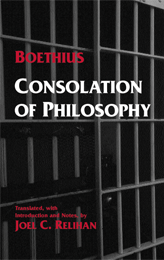
The Consolation of Philosophy
Boethius
(London: Penguin, 1999).
Boethius was one of the strongest advocates of the liberal arts during the Middle Ages. In this text, The Consolation of Philosophy, what we see is not a description of the liberal arts but rather a depiction of how the exercise of reason can help one to live a meaningful and happy life. In this text, the prisoner is talking to Lady Philosophy, and while Boethius is Christian, it is not Christianity that is saving him, but Philosophy. By helping one to contemplate the source of the universe, philosophy assists us in discerning the divine nature of reality. Ultimately, the goal of this text is to show the reader what true happiness looks like.
"Boethius was about how, in a time of hopelessness, Lady Philosophy appears, showing Boethius that happiness cannot be taken away when found inside the self. When found in external things, happiness can be stolen, but not in the self. Lady Philosophy reminds Boethius that through philosophy and contemplation, this happiness can be found. This showed me that my liberal arts education is providing me with knowledge that cannot be taken away. That is what should be important to us because it grants us what cannot be taken, no matter how troubling life is." ~Morgan Lloyd
"In Boethius, we see that the contemplation of the divine, through Lady Philosophy, provides us with the power and free will to be happy." ~Justin Way
THE SEVEN LIBERAL ARTS IN THE MIDDLE AGES

The Seven Liberal Arts in the Middle Ages
D.L. Wagner
(Bloomington: Indiana University Press, 1983).
This volume of essays devotes one chapter to each of the seven traditional liberal arts, divided according to the linguistic arts of the Trivium (Grammar, Rhetoric, Dialectic) and the numerical arts of the Quadrivium (Arithmetic, Music, Geometry, Astronomy). This text, dense with information and insight, is more intellectual history than philosophy, and as such it provides students with a sense of how the seven traditional liberal arts were of great importance to a panoply of thinkers in the Middle Ages.
"The Seven Liberal Arts in the Middle Ages explored each of the seven traditional liberal arts and discussed the writings and authors who affected the evolution of these arts throughout the Middle Ages. It was helpful to see that many of the same people impacted different arts, and it was interesting to see how these writers affected each other and the evolution of each of the arts. It was also helpful to see how each art came to be what it is now." ~Mary Lawrence
"This book was about what makes up the seven liberal arts, or what they were considered to be in the Middle Ages, and the strengths of each one of them. The information in this text brought new depth and insight to what we were covering in class. It also helped to reaffirm why we're studying what we are in both our education as a whole and in this class itself." ~Shelby Berish
ALL THINGS SHINING
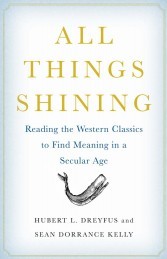
All Things Shining
Hubert Dreyfus and Sean Dorrance Kelly
(New York: Free Press, 2012).
This text does not discuss the liberal arts as such but rather looks at the humanities from the perspective of the Western Classics. After a substantive critique of David Foster Wallace and contemporary nihilism, the authors trace the development of thought from Homer’s polytheism through discussions of Aeschylus, Jesus, Dante, Descartes, and Kant to contemporary monotheism and the turn toward the individual subject. In a penultimate chapter on Melville and in the Conclusion, Kelly and Dreyfus attempt to develop a secular notion of the sacred and of transcendent experience. They believe that mastering a skill involves more than just technical proficiency. Through learning, you become a master at living and able to recognize and appreciate the sacred dimensions of experience, as when one is so adept at a certain activity that they are able to act without thinking about what they are doing.
"All Things Shining shows how the recognition of meaningful forces outside of one's control can help one to become a master in a given field as well as escape the nihilism of the contemporary world. I learned that just as a musician can be receptive to meanings and moods outside himself or herself, a student studying the liberal arts similarly can be receptive to meanings, collaboration, moods, and ideas outside oneself and, in doing so, learn to see the world differently." ~Adam Netsky
"One of the most influential books I read this semester, indeed, one of the most personally significant books I have ever read is All Things Shining. This book discusses a wide range of relatable subjects - from Homer to Dante to Tarantino - to try and make sense of how we interact with the objects around us and what this says about our existence. In the style of Heidegger, Dreyfus and Kelly argue that the most meaningful thing we can do as human beings is to develop skills so that we may interact with the things around us in a meaningful way. It is like the skilled carpenter or musician who has such a refined skill that they actually see the world differently than the rest of us - something in the wood or the instrument is calling to them and directing them. We have all seen such artisans at work - truly it seems as though they have been touched by the divine. This same notion can be extended to one's education - one must refine their skills and exercise their mind to see the world differently. This book is extremely helpful to those of us who thought all meaning was lost in today's secular, nihilistic world." ~Collin Hayes
"This book rescues the reader from a nihilistic, technology-obsessed contemporary world and brings them to a life of meaning. Reading this book showed me that there is meaning that can be found in life, which is essential in order to make the most out of a liberal arts education." ~Elana Tontarski
"All Things Shining is all about allowing the order of the universe to draw actions out of you. Mastering a skill is transcending the immediate physical world and participating in a sacred dimension." ~Gloria Gambino
TAO TE CHING: A NEW ENGLISH VERSION
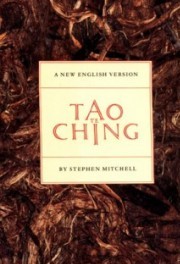
Tao Te Ching: A New English Version
Lao-tzu
(Perennial Classics, 2006).
The Tao te Ching talks about the notion of becoming a Master through non-action, which fits well with the idea in All Things Shining that when one has mastered a skill, performing it seems to flow out of them without effort. This text does not discuss the liberal arts as such, but it talks about learning as a way of achieving harmony with the universe (the Master sees the whole), and for Lao-tzu the Master is one who works without caring about the results of their work. There are also connections to be made between the idea that the liberal arts help you to achieve your humanity and what this text says about doing what is morally right because it is natural for you to do so.
"The Tao te Ching is an Eastern text that is concerned with the way a person is to live their life. They should allow the Tao to flow through them and remove the ego to connect with the divine. From this I learned not to fret from the little things." ~Josh Haak
"This text is about becoming a Master. Any person can get ideas from it about how to live better. It teaches you how to become better in tune with yourself." ~Paxton Brewer
BHAGAVAD GITA: A NEW TRANSLATION
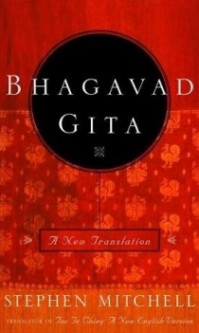
Bhagavad Gita: A New Translation
(NY: Three Rivers, 2000).
Traditionally, the liberal arts involve learning without having specific goals or ends in mind. The goal of learning is to learn and, as such, to live a well-informed and meaningful life. We find this same idea in the ‘Gita,’ in particular where it speaks of ‘renunciation of the fruits of action,’ that is, dedicating oneself to performance of the action but without concern for the results of that action. In this translation, Ghandi writes an essay at the end describing how he derived his famous principle of non-violence from this guiding teaching of the ‘Gita.’
"The 'Bhagavad Gita,' the 'Song of the Blessed One,' is primarily an exultation of the highest Good in the universe. It emphasizes the eternal, indestructible nature of God and our presence in Him (or Her or It). The Gita stresses the outpouring of excellence in a task, not the outcome. Like the Tao - 'Do your work and step back.' In terms of my education, it's not the possession of knowledge that is important but the entire learning process of awe --> curiosity --> inquiry --> discussion. I can't help but feel disappointed when a class ends for the semester because I enjoyed the learning so much. Thankfully, it leads me to more opportunities to learn." ~Casey Holland
"The ‘Gita’ was about the value of peacefulness, being a better person, and being in harmony with God. The greatest message I received from it was that everyone is an incarnation of God and should be treated and valued as such." ~Chase Ferren
NOT FOR PROFIT

Not for Profit
Martha Nussbaum
(Princeton: Princeton University Press, 2010,2012).
This book by Martha Nussbaum is in many respects an abbreviated version of her earlier work, Cultivating Humanity. In its abbreviated form, the book is highly teachable, and it presents new research related to the status of liberal education throughout the world. She reprises her three fundamental tenets of the value of a liberal arts education, namely, that it teaches students critical thinking skills; that it shows them how to be world citizens; and that it helps them to empathize with people who are different from themselves. For Nussbaum, liberal education has the political aim of a healthy democracy, but she is careful to separate a “growth oriented paradigm” from a “human development paradigm.” For her, a healthy democracy involves mutual respect and a sense of reciprocity, such that liberal education has for Nussbaum both political and moral goals.
“In the book Not for Profit, Martha Nussbaum argues for society’s crucial need for reform in higher education. She strives for a liberal arts education that has three primary goals: critical thinking, to be a world citizen, and to be a sympathetic, compassionate person. I learned from this book to be less concerned with test scores and with [education’s] direct effects on the economy. It is more important to value the skills you attain from liberal learning.” ~Michelle Law
“Not for Profit is about how important a liberal arts education is, not only as a type of learning, but to be an active citizen. I learned from this book that without a liberal arts education students are just being trained to be machines.” ~Nicole Napodano
“Not for Profit by Martha Nussbaum is about the liberal arts and their importance to today’s society. She teaches us that we as a society need to be less career and income based and focus more on education and the liberal arts. This taught me to be thankful for my liberal arts education because I now have a broader knowledge about the world.” ~Rachael Gochenaur
“Martha Nussbaum's main argument is that without the liberal arts we are just useful machines and not well-trained educationally. I learned from her how important the liberal arts are for preserving culture and democracy.” ~Mike Beckwith
“Not for Profit by Martha Nussbaum is about the need for a liberal arts education at all colleges and universities in order for students to gain a well-rounded perspective and contribute the skills obtained from their education to a better democracy.” ~Olivia Martinez
WHY CHOOSE THE LIBERAL ARTS?

Why Choose the Liberal Arts?
Mark William Roche
(Notre Dame: University of Notre Dame Press, 2010, 2012).
Mark William Roche was a Dean at Notre Dame, and in this book he is speaking from his own position as someone who worked with students and faculty to advance the cause of liberal education. The book divides into four chapters, which look at 1) the intrinsic value of the liberal arts, 2) the practical value of the liberal arts, 3) the idealistic value of the liberal arts, and 4) the integration of all three of these. Roche provides concrete, specific suggestions about how students can benefit from a liberal arts program. Since he served as a Dean, he is able to speak directly to the experiences of students and faculty on campus. Indeed, many of his examples come from his administrative experience. He discusses, for example, study abroad, the importance of language learning, the development of learning communities, service-learning classes, and even the hiring of new faculty to teach liberal arts courses. But he also discusses values, and he emphasizes the need for students to develop theoretical frameworks, philosophies of life, that can help them to live a life of purpose as moral agents, which ultimately, for him, is the value of a liberal arts education.
LEISURE: THE BASIS OF CULTURE

Leisure: The Basis of Culture
Joseph Pieper
(South Bend: St. Augustine's Press, 1998).
For Joseph Pieper, culture is “everything that lies beyond the utilitarian world.” In this classic text, he claims that there is a whole conception of the human being tied up in the notion of work. Pieper is worried that we view our identity as human beings as being identical to our identity as workers. Along those lines, he wants to say that there is a dimension of intellectual activity that is not work, namely intellectus or contemplation. This is a kind of insight or illumination that is not an immediate effect of intellectual work, but rather involves a kind of effortlessness. Leisure, therefore, is not simply a break or pause in one’s efforts, so that one might then return to work refreshed. Instead, it is a kind of self-affirmation, an attitude of openness, of contemplative celebration, and of wholeness. In this way, leisure is essential to the development of culture.
“Something that I have a very hard time with is the overwhelming feeling that your career is you and that is it. What I loved about this book is the non-work aspects of your life. Pieper describes leisure as a time, not as preparation for work, but as a separate thing altogether. Leisure is the time when you live your life fully, away from your work life. It is all about being yourself and becoming more human – and getting in touch with the divine.” ~Meleana Spera
Essays and Book Chapters
"AN ETHICAL COSMOS" AND "A COSMOLOGICAL ETHICS"
Remi Brague, "An Ethical Cosmos" and "A Cosmological Ethics" from The Wisdom of the World (Chicago: University of Chicago Press, 2003).
These two chapters from Brague’s Wisdom of the World give one a sense of how, in the history of thought, it was believed that the universe had a certain order, structure, and harmony – and that this structure was inherently ethical. The order of the universe was innately good, and many thinkers believed that we could become ethical – i.e., human beings could become ethical and good – by using the universe itself as a model. We would become good by studying the universe and integrating its order into our own lives.
REPUBLIC, BOOKS VI AND VII
Plato’s Republic, Books VI and VII
These two books from the Republic contain Plato’s most famous and memorable passages on the sun, the line, and the cave. But they also present his descriptions of five of the traditional liberal arts: Harmony (Music), Arithmetic, Geometry, Astronomy, and Dialectic. These are excellent texts for introducing the notion of the liberal arts from within the context of the history of philosophy.
"THE REPRESENTATION OF THE LIBERAL ARTS" AND "BOETHIUS AND THE ICONOGRAPHY OF THE LIBERAL ARTS"
Adolf Katzenellenbogen, “The Representation of the Liberal Arts,” Twelfth Century Europe and the Foundations of Modern Society, 39-55 (Greenwood Press, 1980) and Michael Masi, “Boethius and the Iconography of the Liberal Arts” (Latomus 33.1 (1974): 57-75).
These two essays work very well together. Both look at the iconography of the liberal arts, especially at the order and hierarchy of the arts as they are depicted in different works. Also, both analyze the extremely important and beautiful Hortus Deliciarum from Herade of Landsberg. Katzenellenbogen, in particular, looks at the Cathedral at Chartres, which was a center for study of the liberal arts during the Middle Ages. The images discussed in these essays show the integration of secular learning with theological wisdom, the centrality of philosophy to the liberal arts, the ascent through the liberal arts to higher levels of reality, and the place of humans, gods, and animals in the hierarchy of reality. On the whole, they also show the importance of the liberal arts to those living during the Middle Ages.
"ON THE USES OF A LIBERAL ARTS EDUCATION: AS LIGHT ENTERTAINMENT FOR BORED COLLEGE STUDENTS"
Mark Edmundson, "On the Uses of a Liberal Arts Education: As Light Entertainment for Bored College Students" (Harper’s Magazine; Sep 1997; 295, 1768; Research Library pp. 39-49).
This essay from Harper’s is a critique of the consumer culture at colleges and universities. Edmondson highlights, in particular, the lack of passion and enthusiasm in his students, a malaise brought on by a refusal to take any risks with their education for fear that it would threaten their future job prospects. As colleges and universities compete for students, and as departments and programs do the same, education has become more about entertainment and giving students what they want rather than teaching them what is most important for them to learn. This essay sparks considerable discussion and is a great way for students to reflect on the meaning of their college education.
"THIS IS WATER"
David Foster Wallace, "This is Water"
This is the commencement speech that Wallace gave to the graduating class at Kenyon College in 2005. In this speech, he discusses the meaning and importance of the liberal arts as a way of creating meaning in one’s life. For Wallace, whatever meaning your life has is the meaning that you generate by thinking about the world differently. (The speech was taped, and in class we listened to Wallace deliver it.) In All Things Shining, Kelly and Dreyfus present a critique of Wallace and of this speech. They view him as a contemporary nihilist for saying that all meaning is generated ex nihilo through the mind of the individual subject.
- Tiktok
- YouTube
- ZeeMee
© 2026 Nazareth University • Copyright/Privacy • Diversity • Student Right to Know • Employment